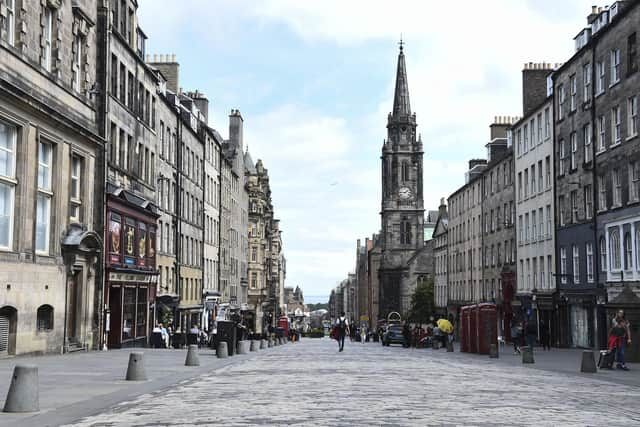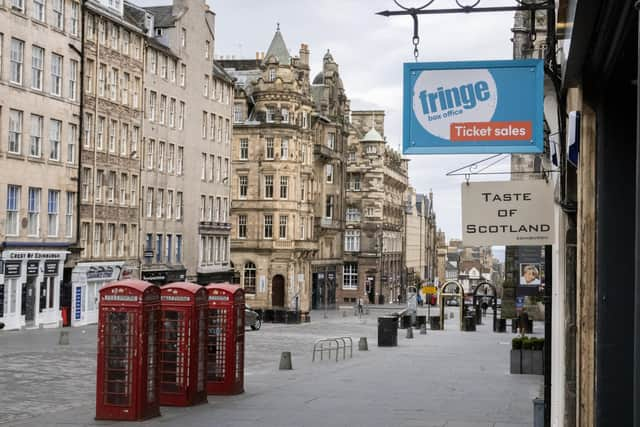Insight: Is Edinburgh going to miss its festivals and how should they bounce back?
and live on Freeview channel 276
Walking up to the Royal Mile, though, the differences begin to reveal themselves.
The towering stands erected each summer for the Tattoo are nowhere to be seen, there are no posters or branding outside the Assembly Hall on The Mound, and a temporary car park has been created at the castle esplanade, where an ice-cream van is attracting a handful of customers.
Advertisement
Hide AdAdvertisement
Hide AdLooking down the Royal Mile, the historic thoroughfares of Castlehill and the Lawnmarket – normally thronged with tourists at this time of year – are being enjoyed by a couple of dozen visitors at most.
Passing a lone piper performing outside the locked-up headquarters of the Edinburgh International Festival, it is hard to believe that the city would normally be on the cusp of hosting the biggest celebration of the arts on the planet by now.
On a hassle-free stroll from Edinburgh Castle to the Bridges – an unthinkable prospect this time last year – I estimate that more than half the businesses in the area are still closed. It is now nearly four months since a joint announcement that the Edinburgh International Festival, the Tattoo, the Fringe and the city’s annual celebrations of visual art and literature would not be going ahead with their planned programmes.
All except the Tattoo have since announced online incarnations, and some small-scale live events may still be allowed in the city if the Scottish Government eases more restrictions. But there is no doubt Edinburgh and its people are about to experience a very different August than the one which seems to be both loved and hated.
Advertisement
Hide AdAdvertisement
Hide AdTwelve months after the city played host to more than 5,000 events, an overall audience of 4.4 million and more than 25,000 performers from 70 countries, debates are already growing over how much Edinburgh is going to miss the festivals this year, whether they should return to the scale of recent years and how they should change in 2021 and beyond.
There have been no shortage of grim predictions about what the absence of the festivals will mean in the short term. An official report for MSPs has estimated that the economy could take a £360 million hit and that 7,000 jobs could be lost. The city council is braced for more than 18,000 jobs to go across the wider tourism sector by the end of 2020.
Francesca Hegyi, executive director at the Edinburgh International Festival, said: “There are lots of people in Edinburgh who rely on the festivals for their livelihoods from those working in the hospitality industry – our hotels, restaurants and bars – and those in the arts industry, the artists, crews, freelancers – all will be missing the income they normally generate at this time of year, as will the wider economy in the city such as taxi drivers, shops and businesses that have counted on the business the festivals bring each year.
“The festivals have been an integral part of the city for over 70 years and so not having that annual celebration will be a strange time, not just for those people directly connected with the festival but for the millions across the world that look to Edinburgh each August for their annual ‘culture fix’.”
Advertisement
Hide AdAdvertisement
Hide AdAs parts of Scotland grapple with an influx of day-trippers and “staycation” holidaymakers, Edinburgh’s business leaders fear the city is about to be hit by a new wave of job losses and permanent closures due to an expected slump in its summer tourism numbers.


Roddy Smith, chief executive of city centre business group Essential Edinburgh, said: “Shorn of tourists and office workers, the business community is really feeling the huge effects of the pandemic. The festivals are always a busy time for retail and hospitality businesses and to miss this crucial trading period will compound the situation they all face.”
A search for a hotel room on the second weekend in August, when most festivals should have been up and running, reveals deals as low as £50 for a night.
Liz McAreavey, chief executive of Edinburgh Chamber of Commerce, predicted that the absence of the summer festivals would have a “devastating impact” on businesses and jobs in the city.
Advertisement
Hide AdAdvertisement
Hide Ad“By now the eyes of the world would be on Edinburgh and hotels and hospitality venues would be full,” she said.


Edinburgh Hotels Association spokesman Russell Imrie said: “The visitors and locals who go to the festivals are a huge boost for our hospitality and retail sectors, who employ tens of thousands of local people. These financial benefits will be absent and the atmosphere in the city will be noticeably different, in a negative way.
“The city will recover from the absence of the festivals but it may have a long-term impact on individual cultural, tourism and hospitality businesses who may not survive without that economic boost this year.”
Established after the Second World War with the aim of bringing people and artists from around the world together in the Scottish capital, Edinburgh’s annual celebration of culture was proudly proclaimed as the world’s biggest arts festival until recently.
Advertisement
Hide AdAdvertisement
Hide AdAudience numbers for the ever-expanding Fringe broke through the three million mark last year and were up 1.25 million on the equivalent figure in 2009. But the annual increases in shows and ticket sales were accompanied by growing concerns about the city centre’s ability to cope with the festivals, in particular the historic Old Town.
Heritage groups began drawing unfavourable comparisons between Edinburgh and Venice three years ago, weeks before the festivals were due to celebrate their 70th anniversary. Warnings that “commercial exploitation” of the city centre was posing a threat to the city’s historic landscape sparked the first in a series of schisms over the impact of the capital’s major events.
Last year saw the launch of a new campaign, Citizen, with the aim of defending the city from over-tourism, gentrification, privatisation of public space and “festivalisation”. One of its first projects was a short film, entitled There’s no Edinburgh in the Festival, which described the long-running arts extravaganza as “a spectacular exercise of lies, hype and profiteering”.


In the run-up to last year’s festival season, the “numbers swelling during its August festivals” were cited in a report naming Edinburgh as one of the world’s worst over-tourism hotspots. Efforts by the city council to ease crowd congestion last August by closing off some streets and bringing in crowd control barriers sparked a new wave of controversy.
Advertisement
Hide AdAdvertisement
Hide AdBy the beginning of 2020, a major change in direction was being signalled. Julia Amour, director of umbrella body Festivals Edinburgh, declared “growth for growth’s sake” was not on the agenda and said the city needed to find better ways of controlling the flows of people and traffic when major events were on.
When the Fringe Society launched its annual review at the end of February, it admitted that the event had an “important part to play” in managing the city during peak periods, also pledging to strike a better balance between celebrating the Fringe as “the world’s greatest celebration of the arts” and making more of its “local roots”.
Among the businesses in the city currently fighting for survival are cultural venues whose Fringe ticket sales help sustain their year-round work.
Mike Jones, managing director at The Stand comedy club, said: “The absence of the summer festivals will leave a massive hole in Edinburgh’s cultural calendar but will also have a significant economic impact on all local businesses.
Advertisement
Hide AdAdvertisement
Hide Ad“Many of those local residents who might have moaned in the past about how August in the city is too busy, with too many tourists and too many folk from south of the Border – you’re going to miss it when it’s gone. It’s going to affect us all to some degree.
“For us, the £1 million that we generate from Fringe ticket and bar sales is a key part of our business model and the absence of that leaves a big hole in our budget, which is already under significant pressure from our enforced closure. Most of all though, we’re going to miss the buzz. Imagine Edinburgh without the Fringe and EIF. We don’t need to imagine, we’re just about to find out.”
At Summerhall, one of the few year-round arts venues in the city which has been able to reopen its doors since lockdown, general manager Rowan Campbell believes the Covid-19 shutdown offers Edinburgh a chance to “take stock and rethink”.
She said: “The festival is a huge thing for the city and defines the summer so much.
Advertisement
Hide AdAdvertisement
Hide AdBut I do think that people are still feeling pretty raw and vulnerable about 2020 so far and perhaps it’s a good chance to reset our collective thinking and remember why we, as a city, love the festivals.
“This is an opportunity for the city to look to improve and break the broken structures and replace them with smarter, better ones.
"We are currently in a situation where we’re desperately working to keep the building open, pay our staff, and support artists and freelancers.
"We have to be cautious to ensure our long-term survival. A fallow season isn’t as terrifying a prospect as losing what we have spent the last nine years building.”
Advertisement
Hide AdAdvertisement
Hide AdEven the harshest critics of how the growth of the festivals has been handled concede that the city will not be the same without them over the next few weeks. But they also see the temporary hiatus as a golden opportunity to ensure they set a course for radical change for future years.
Cliff Hague, chairman of the Cockburn Association heritage watchdog, said: “Of course we are going to miss the summer festivals, which have been one of the city’s trademarks for so long.
“However, there are some things we won’t miss, for example West Princes Street Gardens being fenced off with a security screen or the levels of litter that have become a familiar feature of August in Edinburgh.
"Even before coronavirus struck, some fundamental questions were being asked about the ‘pack ’em in’ ethos that had become turbocharged in recent years, diluting the authentic spirit on offer in the culture and the city.
Advertisement
Hide AdAdvertisement
Hide Ad“We now need to have a broad civic conversation about future festivals. There is a lot to be said for re-localising the Fringe, to nurture and showcase local talent alongside established stars.”
Nick Hotham, head of external relations at Edinburgh World Heritage, said: “The festivals are an integral part of the city’s vibrant culture, as well as an opportunity for people from all over the world to experience art and performance against the stunning backdrop of the Old and New Towns.
“Our concern, as always, is that Edinburgh’s fragile historic environment including its buildings, parks, and other open spaces, remains in good condition, and that the communities that live in the city centre all year round are in no way compromised during the summer.
“Over-commercialisation over the summer period actively detracts from people’s enjoyment of our beautiful city. We therefore ask that the interests of people and place be put at the centre of festival planning, rather than growth for growth’s sake, and that Edinburgh’s unique environment is enhanced, rather than in any way undermined.”
Advertisement
Hide AdAdvertisement
Hide AdMike Small, co-founder of the Citizen campaign, said: “Certainly people will miss the buzz and everyone is crying out for the ‘live’ and the ‘collective’ experience. But many actual residents will also be reflecting on how quiet and different the city is. I think many people will be wondering why we created such a one-dimensional economy and who benefits from this.
“One of the claims that’s often made is the great benefits brought to the city. Yet that myth is blown away. What resilience or infrastructure is in place after more than 70 years? There is no building, trust, funds or anything in place. Its a transient and extractive event.
”The cliché of ‘don’t waste a good crisis’ comes to mind. There is an opportunity now to completely rethink the model of the festival – to go back to first principles and reunite Edinburgh with its festival.”
David Greig, one of Scotland’s leading playwrights, who is also artistic director at the Royal Lyceum Theatre in Edinburgh, said: “This has been a strange year. People have been surprised at what they have missed and what they haven’t missed. We are now going to discover what we miss about the festivals. It’s going to be very interesting.
Advertisement
Hide AdAdvertisement
Hide Ad“On the one hand, people will be able to walk down the High Street without being handed flyers, we will be able to enjoy the city in all sorts of lovely ways and we won’t experience the craziness and the way it seems like the city is taken over.
“On the other hand, Edinburgh will take an incredible hit to its economy, which will affect livelihoods and jobs, and a huge proportion of people who go to see shows actually live in Edinburgh.”
He continued: “Everybody in my industry comes to Edinburgh in August. It is an important city to the cultural world in August. As a result of that it is an important city to the cultural world throughout the year.
“The name ‘Edinburgh’ opens doors in China and the United States and Australia, not because we are a lovely place with a castle. Nearly everybody in cultural life around the world has visited Edinburgh and participated in this extraordinary event.
Advertisement
Hide AdAdvertisement
Hide Ad“I do think some of the stress on the city was getting a bit much. It will maybe be not a bad thing not to have it for a year in order to deeply experience and analyse what things were good and what things were bad. It will probably end up being a good thing for the city and the festivals to have this forced experiment.
"But I think we’ll really miss them. We’ll have to think very hard about how we come back hard in 2021 because if we don’t, there is a real danger that Edinburgh will never quite be the same again.”
Hegyi, who was overseeing plans for only her second EIF, echoed Greig’s sentiments: “This year gives us all an opportunity to think about the best way for us all to come back in future. The cancellation at short notice meant that everyone – the venues, festivals, promoters, the city council – had to work together even more closely than perhaps has happened before. That sense of collaboration has continued as we look to the next few years and what might be possible to do safely.
“We need to make sure that however we come back, it is in a way that works for everyone involved – residents, businesses, the tourism sector, artists, freelancers and seasonal workers, the council and everyone who has a stake.”
Advertisement
Hide AdAdvertisement
Hide AdCity council leader Adam McVey also emphasised the importance of the festivals bouncing back. He said: “Edinburgh has just about the highest rate of citizen participation in the arts anywhere in world, in no small part due our festivals.
“In Edinburgh, performance art isn’t only for the middle classes, it’s for everyone with shows to cater for everyone. We can’t lose that, it’s special.
“Next year is an opportunity to come back better. We’re asking every industry to think about how they build back better by improving our environment, paying workers a fair wage under fair conditions, and working to our long-term strategies of improving wellbeing for our residents, and I know our festivals will continue to change and adapt meet that challenge.
“We’re incredibly proud to be known as the world’s Festival City and, of course, recognise the extremely positive contribution our festivals make to our lives, bringing art to Edinburgh in a way no other city on the planet enjoys.
Advertisement
Hide AdAdvertisement
Hide Ad"I don’t believe we’re at risk of losing our status and in fact I see this as an opportunity to come back better than ever.”
A message from the Editor:
Thank you for reading this story on our website. While I have your attention, I also have an important request to make of you.
The dramatic events of 2020 are having a major impact on many of our advertisers - and consequently the revenue we receive. We are now more reliant than ever on you taking out a digital subscription to support our journalism.
Subscribe to scotsman.com and enjoy unlimited access to Scottish news and information online and on our app. Visit https://www.scotsman.com/subscriptions now to sign up.
Advertisement
Hide AdAdvertisement
Hide AdSubscribe to the Edinburgh Evening News online and enjoy unlimited access to trusted, fact-checked news and sport from Edinburgh and the Lothians. Visit https://www.edinburghnews.scotsman.com/subscriptions now to sign up.
By supporting us, we are able to support you in providing trusted, fact-checked content for this website.
Joy Yates
Editorial Director
Comment Guidelines
National World encourages reader discussion on our stories. User feedback, insights and back-and-forth exchanges add a rich layer of context to reporting. Please review our Community Guidelines before commenting.